外研版九年级英语下册课件Module 3 Life now and then Unit 1(共47张PPT)
文档属性
| 名称 | 外研版九年级英语下册课件Module 3 Life now and then Unit 1(共47张PPT) |
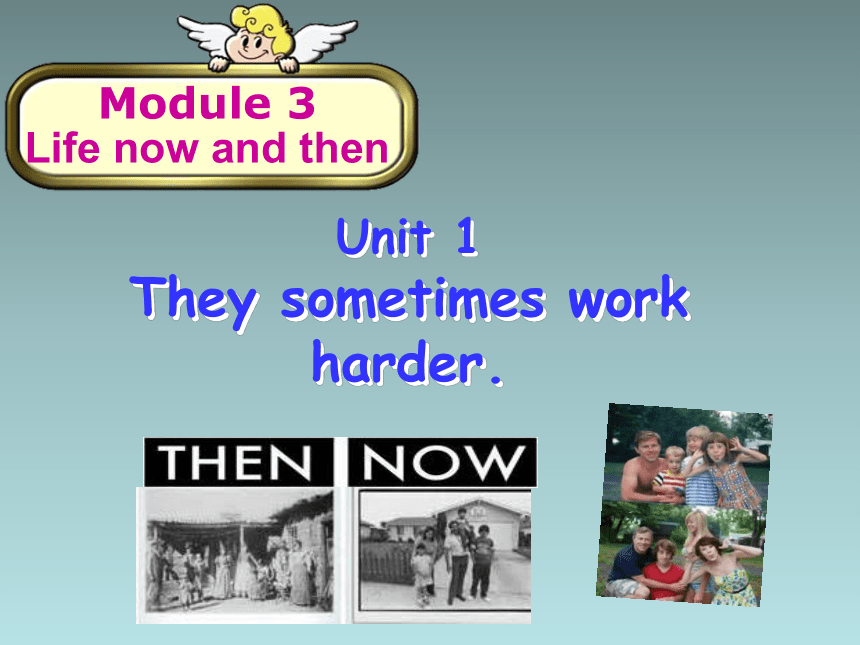
|
|
| 格式 | ppt | ||
| 文件大小 | 18.0MB | ||
| 资源类型 | 教案 | ||
| 版本资源 | 外研版 | ||
| 科目 | 英语 | ||
| 更新时间 | 2022-08-16 18:24:31 | ||
图片预览

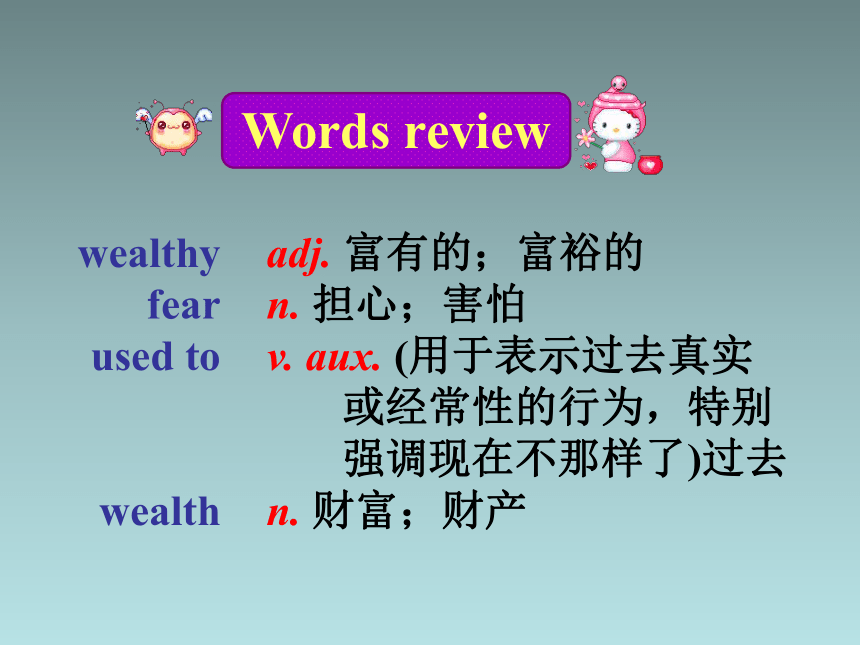

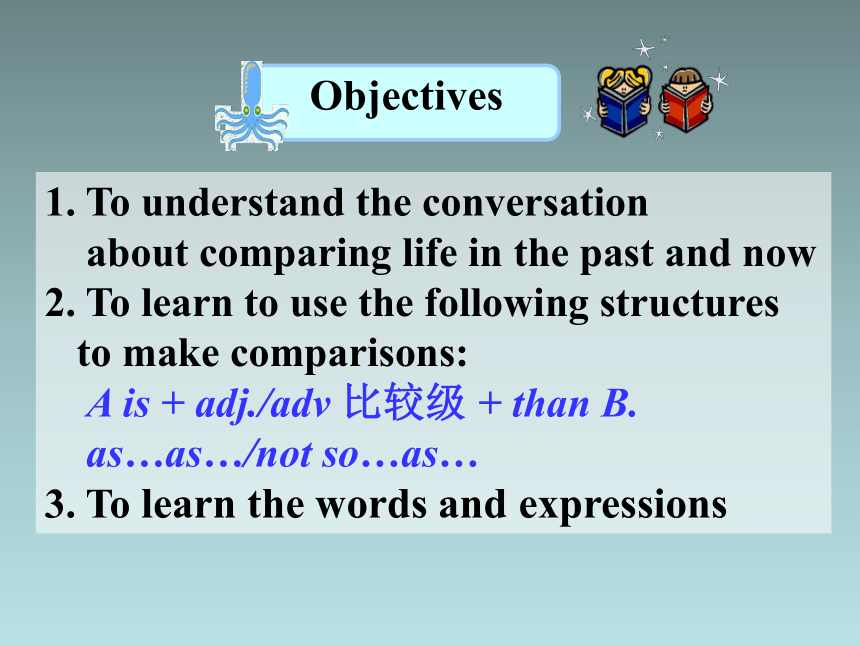
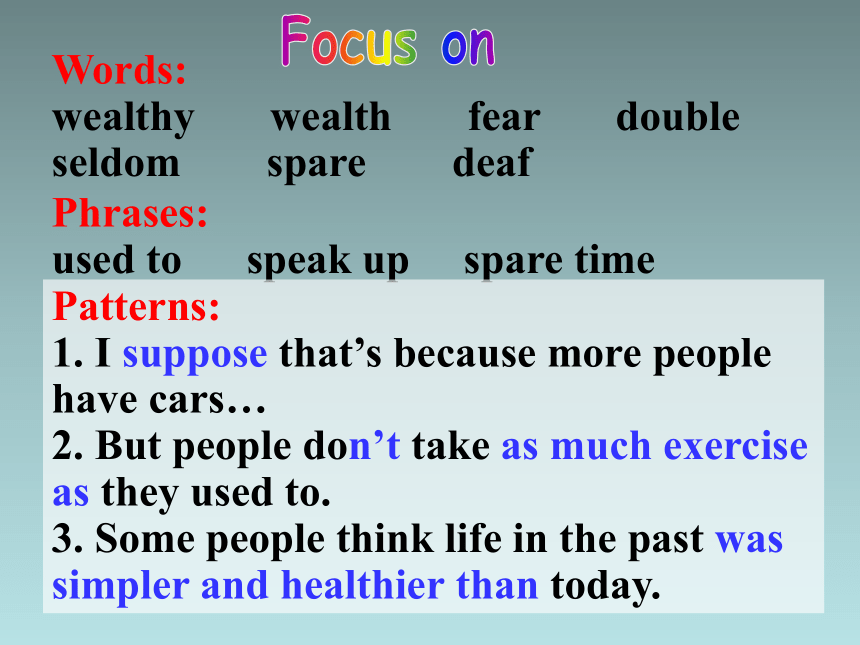
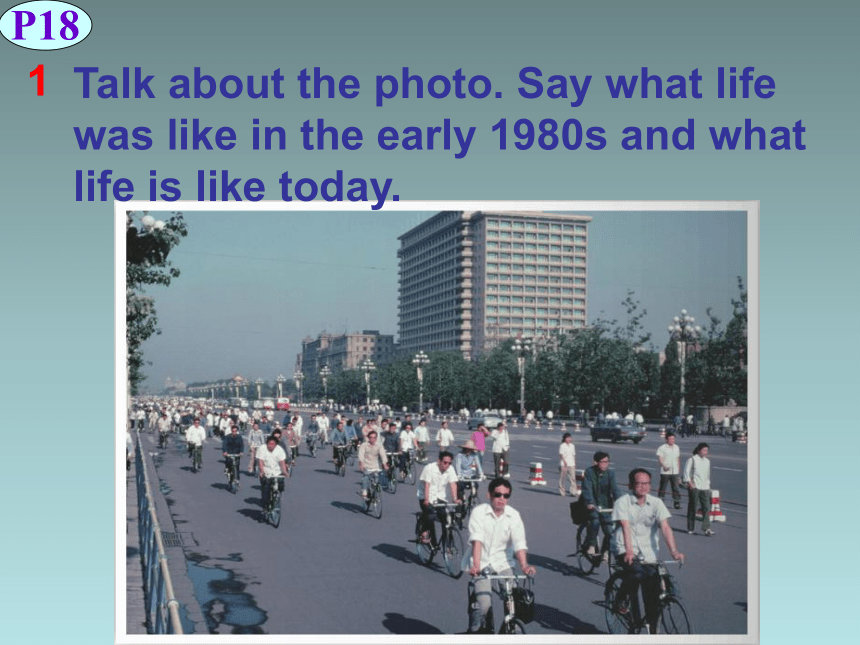
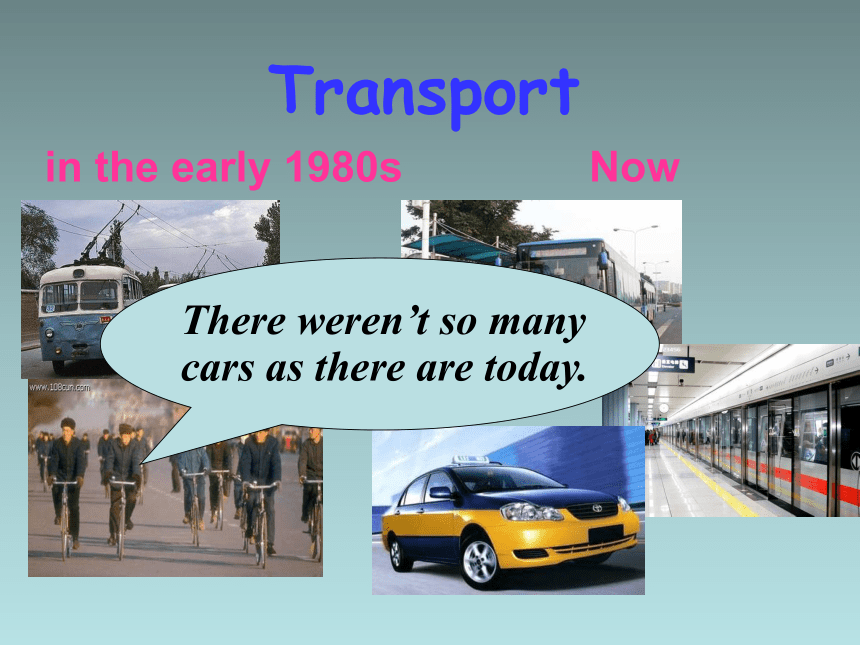
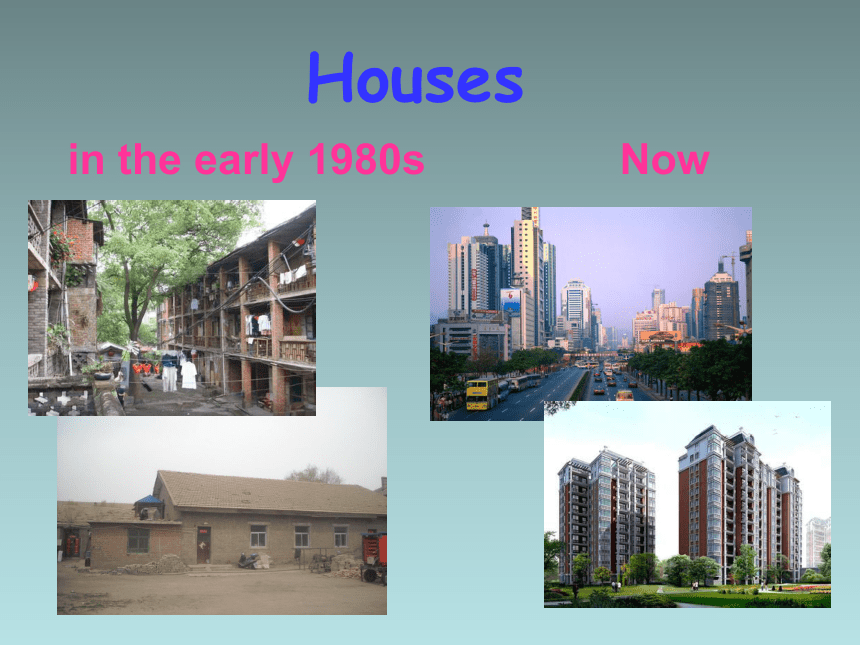

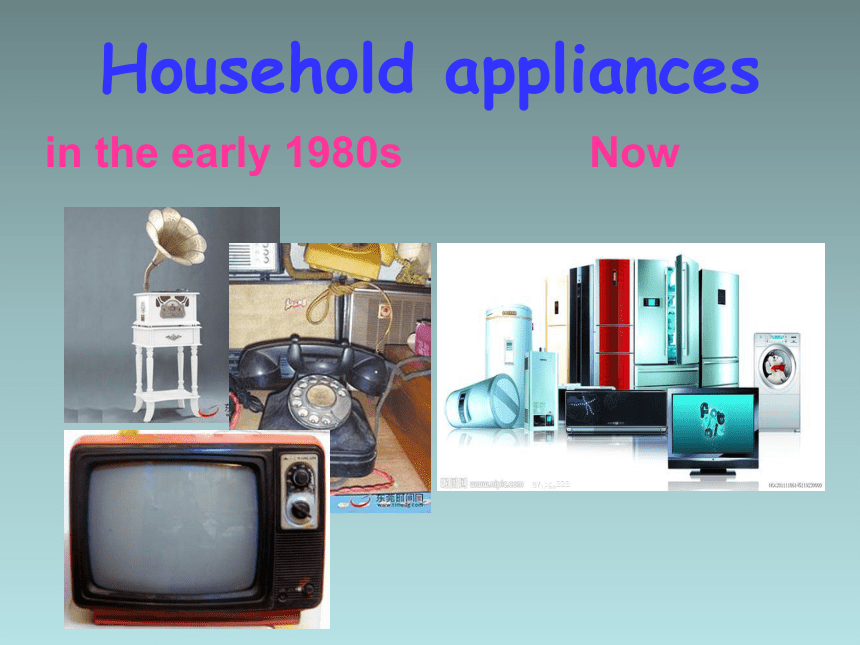
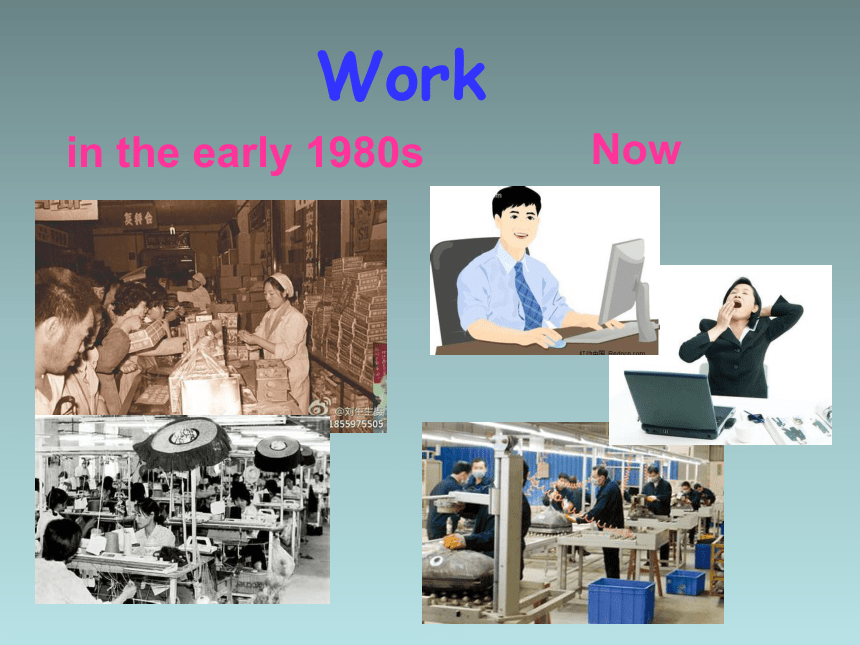

文档简介
(共47张PPT)
Unit 1 They sometimes work harder.
Module 3
Life now and then
wealthy
fear
used to
wealth
adj. 富有的;富裕的
n. 担心;害怕
v. aux. (用于表示过去真实
或经常性的行为,特别
强调现在不那样了)过去
n. 财富;财产
Words review
double
seldom
spare
spare time
speak up
deaf
v. 使加倍;把……增
加一倍
adj. (成)双的;两个……
adv. 很少地;不常
adj. 空余的;备用的
业余时间;闲暇
大点声说
adj. 聋的
Words review
1. To understand the conversation
about comparing life in the past and now
2. To learn to use the following structures to make comparisons:
A is + adj./adv 比较级 + than B.
as…as…/not so…as…
3. To learn the words and expressions
Objectives
Words:
wealthy wealth fear double seldom spare deaf
Phrases:
used to speak up spare time
Patterns:
1. I suppose that’s because more people have cars…
2. But people don’t take as much exercise as they used to.
3. Some people think life in the past was simpler and healthier than today.
Talk about the photo. Say what life was like in the early 1980s and what life is like today.
1
P18
in the early 1980s
Now
Transport
There weren’t so many cars as there are today.
Houses
in the early 1980s
Now
Education
in the early 1980s
Now
Education
What else in the early 1980s is different from the life today
Household appliances
in the early 1980s
Now
Work
in the early 1980s
Now
Environment
in the early 1980s
Now
Now let’s enjoy a video about the differences between the life in the past and present.
Listen and answer the questions.
2
P18
1. What is the history homework
2. What is the question they need to answer
3. What does Betty ask
4. What does Daming ask
Write about life in the past and life today.
The question is “Is life today better than it was in the past ”
Betty asks if they can write about medicine and pollution.
Daming asks if they can write about personal safety.
Betty and his mother are talking about something. Listen and read. Finish the following tasks.
Read and answer the questions.
What are Betty and her mother talking about
2. How many things have they compared
They are talking about life in the past and now./They are comparing life in the past and now.
Four: health, medicine, transport, work.
Task 1
Read and put the words in the box into the correct column.
Task 2
wealthier
walk more
less fear of getting ill
work harder
simpler
live longer
healthier
do more exercise
In the early 1980s
Today
Now make some sentences with the help of the table.
For example:
People are wealthier today.
Read the passage and choose the correct answer.
3
P18
People live longer today because ______.
a) we know more about medicine
b) they do not work as hard as they did
c) they take more exercise
2. There is less fear of getting ill _______.
a) so people live longer
b) because people know how to deal with the ordinary diseases
c) so people work harder than before
Task 3
3. People take less exercise because ____.
a) they do not need to
b) they drive cars instead
c) they do not have cars or bikes
4. People work harder today and ____.
a) they do not live as long as they did
b) they do not usually have enough free
time
c) they live a healthier life
Task 4
1. People live longer than they did in the past.
2. People do more exercise than they used to.
3. More wealth makes people healthier than before.
4. People know more about how to deal with the ordinary diseases today.
5. People worked harder fifty years ago than they do now.
less
less
healthy
did fifty years ago.
work harder now
Read and try to recite the conversations in 5-10 minutes.
1. Read the dialogue aloud for a few minutes by yourself;
2. Role play in groups;
3. Role play in front of the class.
We’ll see which group does the best.
Task 5
Complete the passage with proper words.
Both Betty and her mother think life is better today than in the past. People are _______ and live longer today. But people do __________ than they used to, because they use cars much more. And people sometimes __________ and has less _________ than they did fifty years ago. Although life in the past was ______ and _______, more people think life is better today.
wealthier
less exercise
work harder
spare time
simpler
healthier
Complete the questions with the words or expressions in the box.
4
P19
Task 6
1. What kinds of things do you _______
2. What do you do in your _______ time
3. What can someone not do if they are ______
4. If something is _______, is it more or less
5. Do you think people _______ take more exercise than they do today
6. Do you think people have more _______ today than they used to
deaf doubled fear spare used to wealth
fear
spare
deaf
doubled
used to
wealth
我们可以用形容词和副词的比较级来比较人或事物。常用的句型为“A+比较级+than +B”,表示“比……更……”。
同级比较一般采用as… as…句型,否定句可以用not so/as…as…表示。
Do you think life is better today than in the past
我们应该学会辩证地看待“好”与“坏”。在经济发展、人们生活质量整体提高的背后可能隐藏着很多问题,如:环境污染、人们养尊处优、缺乏锻炼等,要学会客观看待这些变化并以积极的态度面对问题,用实际行动去解决问题,使我们的生活质量得到真正的提高。
Work in groups and talk about the changes of our life now and then from these aspects: health, medicine, transport and work…
Then report it to the class.
Which group is the best
Team racing
Activity
Ready
1. … and there’s less fear of getting ill because we know how to deal with the ordinary diseases.
我们也不太担心生病,因为我们知道如何治疗普通疾病。
deal with意思是“处理;安排;对付 ”,常与疑问副词how搭配使用。如:
How will you deal with the thief who stole the diamond
你将如何处理那个偷了钻石的小偷呢?
2. But people don’t take as much exercise as they used to.
但是人们做的运动并没有过去多。
used to do sth.指“过去常常做某事”,否定形式有两种:didn’t use to或used not to。
请根据汉语提示完成句子 :
My hometown has experienced great changes and life is ________________
________________ (比过去更舒适).
more comfortable than it used to be
3. I suppose that’s because more people have cars…
我想可能是因为更多的人有了车……
suppose表示“猜想”、“认为”,相当于
think或guess。后接否定的宾语从句时通常将否定转移到主句上。如:
I don’t suppose he is really ill.
我看他不是真病了。
我猜想那不是真的。
___________________________
I don’t suppose that it’s true.
4. Remember to speak up! She’s a bit deaf now.
记得说话大点儿声,她现在有点儿耳背了。
speak up表示“大点儿声说”。例如:
Speak up, please. I can’t hear you.
请大声一点儿,我听不见你说话。
In English, the most important words in a sentence are stressed. You need to stress all the words the listener has to hear in order to understand the message.
Stress 重读
分析:
英语国家人士在连贯话语中使用不同的语音手段进行交流,包括重音。
英语句子中,需要重读的词称为句子重音。
一般来说,实词(名词、实义动词、形容词、副词等)需要重读,虚词(介词、连词、冠词等)不需要重读。
Read and predict which words the speaker is likely to stress.
5
P19
Some people think life in the past was simpler and healthier than today. More wealth sometimes means less health. When the number of cars is doubled, the pollution is also doubled, or even worse.
Now listen and check.
Read the paragraph aloud.
6
P19
Work in pairs. Answer the question and give your reasons.
7
P19
Is life better today than in the past
Yes, it is. I think it’s because the life is easier now.
—Is life better today than in the past
—Yes, it is. I think it’s because … /
No, it isn’t. I think …
Now say what is better or worse in:
▲education
▲environment
▲health
What is better in education
Talk
Every child has the chance to go to school and the government tries to provide better learning environment for students.
What is worse in education
The students in poor areas get less and less resources than those in developed areas now.
Talk
What is better in environment now
I think nothing becomes better today than in the past…
So what is worse
People’s activities brought so many pollutions, such as air pollution, noise pollution and water pollution.
Talk
What is better in health today than in the past
People know more about how to keep fit and how to deal with the ordinary diseases.
What is worse in health
People walk less and take less exercise than they used to, so they have more health problems now.
1. used to
2. speak up
3. deal with
4. I suppose that’s because more people have cars.
5. — Is life better today than in the past
— Yes, it is.
6. But people don’t take as much exercise as they used to.
7. Nearly finished.
8. That’s true.
本课时主要短语和句型
总结回顾
Now 2 minutes to test your spelling.
1. English-Chinese
wealthy spare time deaf fear seldom double
2. Chinese-English
过去常常 大点声说 认为
When finishing, exchange your papers to see who does the best.
Ⅰ. 用方框内所给单词的恰当形式填空。
fear spare time seldom double wealth
1. It _______ rains in such a time in winter.
2. He spoke of his _______ of the future of his country’s culture.
3. In her ___________ she reads books on cooking.
4. The girl’s parents are _______. They often buy her beautiful toys.
5. The number of managers must ______ to 100 within 3 years.
seldom
fears
spare time
wealthy
double
Ⅱ. 根据提示翻译句子。
1. 以前在英格兰时,琳达每个星期天都去做礼拜。(used to)
2. 卫生部门(the health authorities)现在知道如何对付这种病了。(deal with)
3. 艾瑞克现在和他爸爸一样高。(as…as…)
Linda used to go to church in England every Sunday.
The health authorities now know how to deal with the disease.
Eric is now as tall as his father.
4. 请大点声,我听不清。(speak up)
5. 贝蒂闲暇时常去购物。(spare time)
Betty often goes shopping in her spare time.
Please speak up! I can’t hear you clearly.
Try to ask your parents about their life in the past (family, work, health, education) and then take some notes.
Finish the exercises in Leaning English.
3. Preview the passage Life now and then on page 20.
Homework
Unit 1 They sometimes work harder.
Module 3
Life now and then
wealthy
fear
used to
wealth
adj. 富有的;富裕的
n. 担心;害怕
v. aux. (用于表示过去真实
或经常性的行为,特别
强调现在不那样了)过去
n. 财富;财产
Words review
double
seldom
spare
spare time
speak up
deaf
v. 使加倍;把……增
加一倍
adj. (成)双的;两个……
adv. 很少地;不常
adj. 空余的;备用的
业余时间;闲暇
大点声说
adj. 聋的
Words review
1. To understand the conversation
about comparing life in the past and now
2. To learn to use the following structures to make comparisons:
A is + adj./adv 比较级 + than B.
as…as…/not so…as…
3. To learn the words and expressions
Objectives
Words:
wealthy wealth fear double seldom spare deaf
Phrases:
used to speak up spare time
Patterns:
1. I suppose that’s because more people have cars…
2. But people don’t take as much exercise as they used to.
3. Some people think life in the past was simpler and healthier than today.
Talk about the photo. Say what life was like in the early 1980s and what life is like today.
1
P18
in the early 1980s
Now
Transport
There weren’t so many cars as there are today.
Houses
in the early 1980s
Now
Education
in the early 1980s
Now
Education
What else in the early 1980s is different from the life today
Household appliances
in the early 1980s
Now
Work
in the early 1980s
Now
Environment
in the early 1980s
Now
Now let’s enjoy a video about the differences between the life in the past and present.
Listen and answer the questions.
2
P18
1. What is the history homework
2. What is the question they need to answer
3. What does Betty ask
4. What does Daming ask
Write about life in the past and life today.
The question is “Is life today better than it was in the past ”
Betty asks if they can write about medicine and pollution.
Daming asks if they can write about personal safety.
Betty and his mother are talking about something. Listen and read. Finish the following tasks.
Read and answer the questions.
What are Betty and her mother talking about
2. How many things have they compared
They are talking about life in the past and now./They are comparing life in the past and now.
Four: health, medicine, transport, work.
Task 1
Read and put the words in the box into the correct column.
Task 2
wealthier
walk more
less fear of getting ill
work harder
simpler
live longer
healthier
do more exercise
In the early 1980s
Today
Now make some sentences with the help of the table.
For example:
People are wealthier today.
Read the passage and choose the correct answer.
3
P18
People live longer today because ______.
a) we know more about medicine
b) they do not work as hard as they did
c) they take more exercise
2. There is less fear of getting ill _______.
a) so people live longer
b) because people know how to deal with the ordinary diseases
c) so people work harder than before
Task 3
3. People take less exercise because ____.
a) they do not need to
b) they drive cars instead
c) they do not have cars or bikes
4. People work harder today and ____.
a) they do not live as long as they did
b) they do not usually have enough free
time
c) they live a healthier life
Task 4
1. People live longer than they did in the past.
2. People do more exercise than they used to.
3. More wealth makes people healthier than before.
4. People know more about how to deal with the ordinary diseases today.
5. People worked harder fifty years ago than they do now.
less
less
healthy
did fifty years ago.
work harder now
Read and try to recite the conversations in 5-10 minutes.
1. Read the dialogue aloud for a few minutes by yourself;
2. Role play in groups;
3. Role play in front of the class.
We’ll see which group does the best.
Task 5
Complete the passage with proper words.
Both Betty and her mother think life is better today than in the past. People are _______ and live longer today. But people do __________ than they used to, because they use cars much more. And people sometimes __________ and has less _________ than they did fifty years ago. Although life in the past was ______ and _______, more people think life is better today.
wealthier
less exercise
work harder
spare time
simpler
healthier
Complete the questions with the words or expressions in the box.
4
P19
Task 6
1. What kinds of things do you _______
2. What do you do in your _______ time
3. What can someone not do if they are ______
4. If something is _______, is it more or less
5. Do you think people _______ take more exercise than they do today
6. Do you think people have more _______ today than they used to
deaf doubled fear spare used to wealth
fear
spare
deaf
doubled
used to
wealth
我们可以用形容词和副词的比较级来比较人或事物。常用的句型为“A+比较级+than +B”,表示“比……更……”。
同级比较一般采用as… as…句型,否定句可以用not so/as…as…表示。
Do you think life is better today than in the past
我们应该学会辩证地看待“好”与“坏”。在经济发展、人们生活质量整体提高的背后可能隐藏着很多问题,如:环境污染、人们养尊处优、缺乏锻炼等,要学会客观看待这些变化并以积极的态度面对问题,用实际行动去解决问题,使我们的生活质量得到真正的提高。
Work in groups and talk about the changes of our life now and then from these aspects: health, medicine, transport and work…
Then report it to the class.
Which group is the best
Team racing
Activity
Ready
1. … and there’s less fear of getting ill because we know how to deal with the ordinary diseases.
我们也不太担心生病,因为我们知道如何治疗普通疾病。
deal with意思是“处理;安排;对付 ”,常与疑问副词how搭配使用。如:
How will you deal with the thief who stole the diamond
你将如何处理那个偷了钻石的小偷呢?
2. But people don’t take as much exercise as they used to.
但是人们做的运动并没有过去多。
used to do sth.指“过去常常做某事”,否定形式有两种:didn’t use to或used not to。
请根据汉语提示完成句子 :
My hometown has experienced great changes and life is ________________
________________ (比过去更舒适).
more comfortable than it used to be
3. I suppose that’s because more people have cars…
我想可能是因为更多的人有了车……
suppose表示“猜想”、“认为”,相当于
think或guess。后接否定的宾语从句时通常将否定转移到主句上。如:
I don’t suppose he is really ill.
我看他不是真病了。
我猜想那不是真的。
___________________________
I don’t suppose that it’s true.
4. Remember to speak up! She’s a bit deaf now.
记得说话大点儿声,她现在有点儿耳背了。
speak up表示“大点儿声说”。例如:
Speak up, please. I can’t hear you.
请大声一点儿,我听不见你说话。
In English, the most important words in a sentence are stressed. You need to stress all the words the listener has to hear in order to understand the message.
Stress 重读
分析:
英语国家人士在连贯话语中使用不同的语音手段进行交流,包括重音。
英语句子中,需要重读的词称为句子重音。
一般来说,实词(名词、实义动词、形容词、副词等)需要重读,虚词(介词、连词、冠词等)不需要重读。
Read and predict which words the speaker is likely to stress.
5
P19
Some people think life in the past was simpler and healthier than today. More wealth sometimes means less health. When the number of cars is doubled, the pollution is also doubled, or even worse.
Now listen and check.
Read the paragraph aloud.
6
P19
Work in pairs. Answer the question and give your reasons.
7
P19
Is life better today than in the past
Yes, it is. I think it’s because the life is easier now.
—Is life better today than in the past
—Yes, it is. I think it’s because … /
No, it isn’t. I think …
Now say what is better or worse in:
▲education
▲environment
▲health
What is better in education
Talk
Every child has the chance to go to school and the government tries to provide better learning environment for students.
What is worse in education
The students in poor areas get less and less resources than those in developed areas now.
Talk
What is better in environment now
I think nothing becomes better today than in the past…
So what is worse
People’s activities brought so many pollutions, such as air pollution, noise pollution and water pollution.
Talk
What is better in health today than in the past
People know more about how to keep fit and how to deal with the ordinary diseases.
What is worse in health
People walk less and take less exercise than they used to, so they have more health problems now.
1. used to
2. speak up
3. deal with
4. I suppose that’s because more people have cars.
5. — Is life better today than in the past
— Yes, it is.
6. But people don’t take as much exercise as they used to.
7. Nearly finished.
8. That’s true.
本课时主要短语和句型
总结回顾
Now 2 minutes to test your spelling.
1. English-Chinese
wealthy spare time deaf fear seldom double
2. Chinese-English
过去常常 大点声说 认为
When finishing, exchange your papers to see who does the best.
Ⅰ. 用方框内所给单词的恰当形式填空。
fear spare time seldom double wealth
1. It _______ rains in such a time in winter.
2. He spoke of his _______ of the future of his country’s culture.
3. In her ___________ she reads books on cooking.
4. The girl’s parents are _______. They often buy her beautiful toys.
5. The number of managers must ______ to 100 within 3 years.
seldom
fears
spare time
wealthy
double
Ⅱ. 根据提示翻译句子。
1. 以前在英格兰时,琳达每个星期天都去做礼拜。(used to)
2. 卫生部门(the health authorities)现在知道如何对付这种病了。(deal with)
3. 艾瑞克现在和他爸爸一样高。(as…as…)
Linda used to go to church in England every Sunday.
The health authorities now know how to deal with the disease.
Eric is now as tall as his father.
4. 请大点声,我听不清。(speak up)
5. 贝蒂闲暇时常去购物。(spare time)
Betty often goes shopping in her spare time.
Please speak up! I can’t hear you clearly.
Try to ask your parents about their life in the past (family, work, health, education) and then take some notes.
Finish the exercises in Leaning English.
3. Preview the passage Life now and then on page 20.
Homework
同课章节目录
- Module 1 Travel
- Unit 1 We toured the city by bus and by taxi
- Unit 2 It's a long story.
- Unit 3 Language in use
- Module 2 Education
- Unit 1 They don't sit in rows.
- Unit 2 What do I like best about school?
- Unit 3 Language in use
- Module 3 Life now and then
- Unit 1 They sometimes work harder.
- Unit 2 I think life is better today.
- Unit 3 Language in use.
- Module 4 Rules and suggestions
- Unit 1 You must be careful of falling stones.
- Unit 2 we must keep the camp clean.
- Unit 3 Language in use.
- Revison A
- Module 5 Look after yourself
- Unit 1 We'd better get you to hospital.
- Unit 2 Get off the sofa!
- Unit 3 Language in use.
- Module 6 Eating togethe
- Unit 1 When is the school-leavers' party?
- Unit 2 Knives and forks are used for most Western
- Unit 3 Language in use
- Module 7 English for you and me
- Unit 1 Have you ever been to an English corner?
- Unit 2 We all own English.
- Unit 3 Language in use
- Module 8 My future life
- Unit 1 Here's to our friendship and the future
- Unit 2 I know that you will be better at maths.
- Unit 3 Language in use
- Revison B
